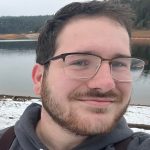Dynamics of Ecological and Evolutionary Processes Lab is based in 5350 Storer Hall at the Unversity of California, Davis. It is a group of people working on the modeling, analysis, and simulation of ecological and evolutionary processes. I am currently looking for undergraduate and graduate students to join the lab. If you are interested, contact me.
current DEEP affiliates
Joe Brennan (BS 2022 College of Charleston). Joe is broadly interested in the ecological and evolutionary mechanisms that shape coexistence, community assembly, and disassembly.His current research applies invasion analysis and Modern Coexistence Theory to explore howextinction influences communitydynamics and how to bridge concepts and methodologies from community assembly and disassembly. Beyond these specific areas, Joe enjoys thinking about all aspects of population, evolutionary, and community ecology!
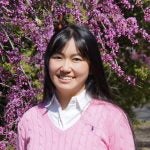 Xuan “Kelsy” Fei (BS 2023 Wake Forest University) As a mathematician in the Graduate Group of Applied Mathematics, Kelsy brings ecological perspectives to her work on complex dynamical systems. At the intersection of mathematics and ecology, she investigates how environmental variability, nonlinear dynamics, and stochastic processes drive species coexistence and shape community structure. Her research combines dynamical systems theory with computational modeling to study competition in seasonally variable environments, with a particular focus on how periodic forcing interacts with stochastic disturbances to influence ecological trajectories over time. Away from the equations and modeling, Kelsy enjoys knitting, reading, and studying languages.
Xuan “Kelsy” Fei (BS 2023 Wake Forest University) As a mathematician in the Graduate Group of Applied Mathematics, Kelsy brings ecological perspectives to her work on complex dynamical systems. At the intersection of mathematics and ecology, she investigates how environmental variability, nonlinear dynamics, and stochastic processes drive species coexistence and shape community structure. Her research combines dynamical systems theory with computational modeling to study competition in seasonally variable environments, with a particular focus on how periodic forcing interacts with stochastic disturbances to influence ecological trajectories over time. Away from the equations and modeling, Kelsy enjoys knitting, reading, and studying languages.
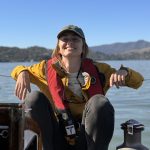 Kate Jones (BS 2019 UC Davis) Kate is a mathematician in the Graduate Group of Applied Mathematics with a focus on ecology. She is broadly interested in dynamical systems and is currently working on an epidemiological model exploring how ecology, behavior, and immunology shape infection dynamics across multiple hosts of a complex life cycle helminth system. Kate is also interested inhow models of this nature may inform policy decisions and management of parasites in wildlife and agriculture. In her free time, she enjoys rock climbing, paddle boarding, painting, and attending concerts.
Kate Jones (BS 2019 UC Davis) Kate is a mathematician in the Graduate Group of Applied Mathematics with a focus on ecology. She is broadly interested in dynamical systems and is currently working on an epidemiological model exploring how ecology, behavior, and immunology shape infection dynamics across multiple hosts of a complex life cycle helminth system. Kate is also interested inhow models of this nature may inform policy decisions and management of parasites in wildlife and agriculture. In her free time, she enjoys rock climbing, paddle boarding, painting, and attending concerts.
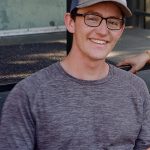 Jakob Kaare-Rasmussen (BS 2023 UC Santa Barbara) Jakob is a theoretical ecologist in the Population Biology Graduate Group with a background in developing dynamical system models to understand the complex behaviors of ecological systems, particularly in the context of anthropogenic change. His previous work has focused onmarine ecosystems, exploring the interplay between parasitism and mutualism in Cnidaria species in the face of heat waves and other climate-relatedstressors. More recently, Jakob has shifted his attention to terrestrial systems, investigating the impacts of habitat destruction and drought on trees, with a particular emphasis on their below-ground mutualist partners, such as mycorrhizal fungi. He is especially interested in exploring transient dynamics to inform management strategies and using flow-kick style models to describe pulsed disturbances on ecological systems. Outside of his research, Jakob enjoys a variety of outdoor activities including climbing, backpacking, running, and skiing.
Jakob Kaare-Rasmussen (BS 2023 UC Santa Barbara) Jakob is a theoretical ecologist in the Population Biology Graduate Group with a background in developing dynamical system models to understand the complex behaviors of ecological systems, particularly in the context of anthropogenic change. His previous work has focused onmarine ecosystems, exploring the interplay between parasitism and mutualism in Cnidaria species in the face of heat waves and other climate-relatedstressors. More recently, Jakob has shifted his attention to terrestrial systems, investigating the impacts of habitat destruction and drought on trees, with a particular emphasis on their below-ground mutualist partners, such as mycorrhizal fungi. He is especially interested in exploring transient dynamics to inform management strategies and using flow-kick style models to describe pulsed disturbances on ecological systems. Outside of his research, Jakob enjoys a variety of outdoor activities including climbing, backpacking, running, and skiing.
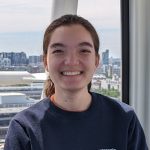
Clara Szego | cszego@ucdavis.edu Clara is a fourth year undergraduate majoring in Evolution, Ecology, and Biodiversity. She is broadly interested in species coexistence and community assembly dynamics, particularly how community structure responds to anthropogenic disturbances. She is also passionate about biology education, focusing on how quantitative thinking and mathematical models can be integrated into undergraduate molecular biology courses and strengthen students’ understanding of molecular techniques.
past DEEP affiliates
- Post-docs
- Mathieu Faure was a post-doc who works on stochastic approximations, quasi-stationary distributions of randomly-perturbed set-valued dynamics, and replicator processes. Mathieu is a faculty member at the Groupement de Recherche en Economie Quantitative d’Aix Marseille
- Ryusuke Kon (2007-2008) was a Japan Society for the Promotion of Science research fellow from Japan who analyzed the dynamics of host-parasitoid communities and competitive communities with a storage effect. Ryusuke is a tenured Faculty of Engineering at the University of Miyazaki in Japan.
- Peter Ralph was a post-doc working with Graham Coop and myself. He is an Assistant Professor at the Institute of Ecology and Evolution at the University of Oregon.
- Joshua Rapp was a NSF post-doc with myself, Neal Williams and Jay Rosenheim who works on the evolution of flower number and reproductive resource allocations in stochastic pollination environments. He is currently a Postdoctoral Researcher at the University of Massachusetts Amherst and an Associate at the Harvard Forest.
- Carolina Reigada was a post-doc who works on metapopulation dynamics in ephemeral habitats. Carolina is currently a post-doc at University of Sao Paulo.
- Gregory Roth was a post-doctoral fellow sponsored by the Swiss and US National Science Foundations. While in Davis, Gregory worked on coexistence and population persistence in stochastic environments. He is research scientist at the
Friedrich Miescher Institute for Biomedical Research.
- Peter Zee was a post-doctoral fellow at CSU/Northridge working with Casey terHorst and myself on the effects of eco-evolutionary feedbacks on community stability. He is an Assistant Professor at the University of Mississippi.
- Graduate Students
- Brian Alger (MS 2011 in Applied Mathematics, UCD) worked on the relative roles of the storage effect and the competition-colonization trade-off on coexistence. Brian is a Computational Scientist in the Modeling and Simulation Department at the Idaho National Laboratory
- Dale Clement (Ph.D. 2022 in Population Biology) studied the evolution of caching behavior of scatter-hoarders, the evolution of within-generation and transgenerational plasticity, and the competing roles of demographic stochasticity and genetic drift on evolutionary rescue. He is currently a post-doc with Nicholas Kortessis at WFU.
- Michael Culshaw-Maurer (Ph.D. 2021 in Ecology) studied non-lethal effects of parasitoids on tri-trophic dynamics and disease-induced cannibalism on host-pathogen dynamics. He is currently postdoctoral researcher working with The Carpentries and CyVerse at University of Arizona, Tucson.
- William Cuello (PhD 2019 in Applied Mathematics) worked on the evolution of bet-hedging in winter Sonoran annuals and providing a mathematically rigorous foundation for Peter Chesson’s small-noise, coexistence theory. William currently is a Hill Visiting Assistant Professor at Rutgers University.
- Nick Fabina (PhD 2014 in Population Biology, UCD) worked on understanding symbiodinium-coral associations using network theory and coral reef dynamics in disturbed environments. He is currently a principle data scientist for Salo Sciences
- Kelsey Lyberger (Ph.D. 2021 in Population Biology) studied life-history evolution and eco-evolutionary feedbacks with Daphnia, evolutionary rescue in response to press perturbations, and phytoplankton-zooplankton community ecology. She is an Assistant Professor at Arizona State University.
- Sam Fleischer (Ph.D. 2021 in Applied Mathematics) studied the role of eco-evolutionary dynamics on predator mediated coexistence, predator-prey cycles, and predator diet choice and immune response. He is a Senior Quantitative Analyst for the LA Dodgers.
- Bailey Meeker (MS 2013 in Applied Mathematics UCD) worked on temporal variation in the environment and phenotypic variation among individuals affects the spread of invasive species. She is a
- Matt Meisner (PhD 2015 in Population Biology, UCD) was co-advised by Jay Rosenheim and myself. His thesis focused on apply big data methods (e.g. machine learning) to datasets from the cotton and citrus industry. He is the Head of Data Analytics at the Farmers Business Network
- Jacob Moore (PhD 2017 in Population Biology, UCD) used integral projection models (IPMs) to address questions in restoration of oysters and the dynamics of open populations with stochastic recruitment and local demography. Jacob was the Undergraduate Research Coordinator at University of Minnesota.
- Swati Patel (PhD 2016 in Applied Mathematics, UCD) worked on the effects of eco-evolutionary feedbacks on species coexistence and community stability. She is an Assistant Professor of Mathematics at Oregon State University.
- Nicholas Roberts, (MS 2019 in Applied Mathematics, UCD) worked on the evolution of cue integration systems in stochastic environments and extinction risk following human induced rapid environmental change. Nicholas is currently a PhD student at University of Vermont in Complex Systems & Data Science.
- Will Tarantino (MS 2008, VIMS) was co-advised by Emmett Duffy and myself. He studied the effects of adaptive foraging and community assembly on biodiversity and ecosystem processes.
past students
Prior to coming to UCD, I had the privledge with working the following students:
- Graduate students
- Peter Caldwell (MS 2001, WWU) got a Ph.D. in Atmospheric Science from the University of Washington and is currently a post-doctoral researcher at Lawrence Livermore National Laboratory.
- Daniel Graber (MS 2001, WWU) is a Mathematics Instructor Skagit Valley Community College.
- Chris Killingstad (MS 2002, WWU) is an instructor at Everett Community College
- Bobby Smith (MS 1999, WWU) works at the Fred Hutchinson Cancer Research Center.
- Undergraduate Students
- Kyle Cox, (BS 2018, UCD) worked on eco-evo feedbacks in diploid population living in a source-sink landscape.
- Evan Saltzman (BS 2008, WM) worked on the evolution of dispersal and is Ph.D. student in OR at GIT.
- Matt Holden (BS 2008, UCD) worked on dispersal in heterogeneous environments, got an applied math Ph.D. at Cornell, and is research fellow and lecturer at University of Queensland.
- Adam Carpenter (BS 2008, WM) worked on effects of spatial and temporal heterogeneity on diversity and ecosystem processes.
- Jennifer “Jef” Akst (BS 2004, WM) worked on modeling the evolution of kleptoparasitism and is a Ph.D. in Wade’s Lab at University of Indiana.
- Kevin Armstrong (2004) (BS 2004, WM) wrote MatLab code for simulating continuous time Markov chain models of community assembly and is a Ph.D. student in mathematics at University of Maryland.
- Bill Dirks (BS 1999, WWU) did his senior honor project on “Spiking and Oscillation in Neuronal Models” and received a NSF pre-doctoral fellowship in 1999 to attend Cornell as a Ph.D. student in Applied Mathematics.
- Jason Keagy (BS 2003, WM) collaborated with Dan Cristol and myself on the effects of replacing source habitats with sink habitats that was published in Restoration Ecology. He got his a PhD at University of Maryland and is currently a post-doctoral student at University of Illinois.
- Molly Kelton (BS 2005, Vassar) worked on competition in source-sink environments that lead to a publication in Journal of Animal Ecology. Molly is now an Assistant Professor of Mathematics Education at Washington State University.
- Seth Rittenhouse (BS 2002, WWU) worked on intransititiveis in community assembly that lead to a publication in Oikos. He get his Ph.D. in Physics at the University of Colorado, Boulder. After a stint as a professor at WWU, he became a physics Professor at the US Naval Academy.
- Eric Ruggieri (BS 2006, Providence) analyzed the Schoener-Holt-Polis model of intraguild predation that appeared in Mathematical Biosciences and Engineering, got his Ph.D. in applied mathematics at Brown University, and now is an Assistant Professor at Holy Cross.
- Glory Tobiason (BS 2001, WWU) worked on the evolution of consumers competing for two resources that was published in the J. Math. Biol., spent two years living on the slopes of Mt. Kilimanjaro as a Peace Corps volunteer in Tanzania, taught math for several years at an alternative high school in Washington DC. Molly is now a research scientist at CRESST.
- Jake Wamsley (BS 2006, WM) studied the effect of spatial heterogeneity on population abundance and persistence and is pursuing a Ph.D. in biochemistry at University of Virginia.
- Melanie Vejdani (BS 2005, WM) analyzed the co-evolution of host-parasitoid interactions in spatially heterogeneous environments.
